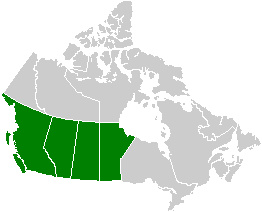
Western alienation
Western alienation, in the context of Canadian politics, refers to the notion that the Western provinces—British Columbia, Alberta, Saskatchewan and Manitoba—have been marginalized within Confederation, particularly compared to Ontario and Quebec, Canada's two largest provinces. Expressions of western alienation frequently allege that those provinces are politically over-represented and receive out-sized economic benefits at the expense of western Canadians.[1]
Western alienation has a long history within Canada, dating back to the nineteenth century. It has led to the establishment of many Western regional political parties at both the provincial and federal levels and from both the right and left sides of the political spectrum, although since the 1980s western alienation has been more closely associated with conservative politics. While such movements have tended to express a desire for a larger place for the west within Confederation, western alienation has at times resulted in calls for western separatism and independence. Given this long history, western alienation has had a profound impact on the development of Canadian politics.
According to a 2019 analysis by Global News, Western alienation is considered especially potent in Alberta and Saskatchewan politics.[2] However, alienation sentiments vary over time and place. For instance, a 2010 study published by the Canada West Foundation found that such sentiments had decreased across the region in the first decade of the twenty-first century.[3] More recently, a 2019 Ipsos poll found historically high levels of support for secession from Canada in both Alberta and Saskatchewan.[4]
Responses to western alienation[edit]
Federal government[edit]
In the 1980s, Pierre Trudeau called talk of western alienation and separatism a "bargaining tool" for the west, and urged the west to find ways to get more representation in the federal government.[39] For his part, given the lack of Liberal representation in the west—his party won only two seats west of Ontario, both of them in Manitoba—Trudeau took the uncommon step of appointing western senators to his cabinet.[55][56]
Amidst criticism that the federal government was inhibiting pipeline development, Justin Trudeau's Liberals purchased the Trans Mountain pipeline in 2018 to try and help ensure the completion of its expansion project, which has before and since been mired in financial uncertainty.[57][58]
First Nations[edit]
First Nations leaders have often asserted that they have been forgotten in discussions of western alienation. Given that First Nations in Canada have direct relationships with the federal government, and the large number of First Nations in western Canada, such assertions complicate those discussions. This is particularly true in British Columbia, where a large number of First Nations have never entered into treaty agreements with the federal government.[59]
In recent years, Indigenous leaders have pushed back against talk of western alienation, particularly talk of western separatism. In 2019, Assembly of First Nations National Chief Perry Bellegarde said that First Nations consent would be required for any secession, given that "provincial boundaries came after treaty territories", further adding that western leaders "have to be careful when you go down that road of Western alienation... We have inherent rights... and those are international agreements with the Crown."[60] Saskatoon Tribal Council Chief Marc Arcand added that any western province "does not have the authority to decide if they want to separate".[60] First Nations chiefs from Treaty 8 territory also released a statement in 2019, declaring that they were "strongly opposed to the idea of separation from Canada."[61] First Nations leaders have been similarly vocal in their opposition to the 2022 Alberta Sovereignty and Saskatchewan First Acts, arguing that they infringe on treaty rights and circumvent their relationship with the Crown. Both Acts were drafted without consultation with Indigenous communities.[62]